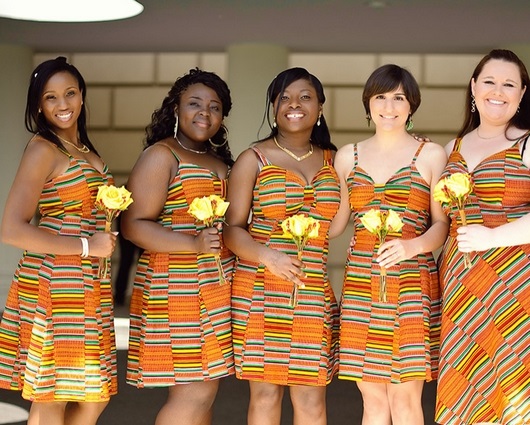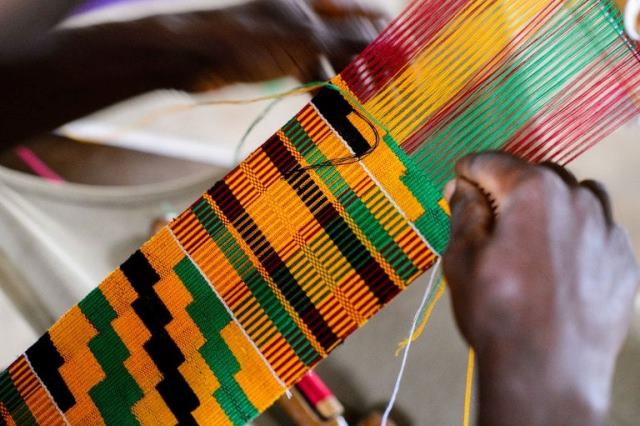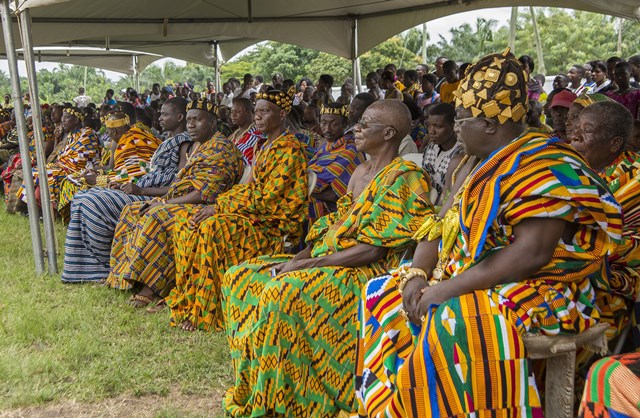Last Updated on March 19, 2023
Kente cloth is a colorful and intricate textile that has represented African heritage for centuries. It is made from strips of silk and cotton and has a rich cultural history. It symbolizes wealth, status, spirituality, and social values.
The story of Kente cloth is fascinating and shows the enduring power of African traditions. In this article, we’ll explore the history and significance of Kente cloth and why it remains an important symbol of African identity today.

What Is the Kente Cloth?
Kente cloth is a traditional fabric from the Ashanti Kingdom in present-day Ghana, West Africa. It is made by weaving together narrow strips of silk or cotton to create a colorful, intricate, and distinctive pattern.
Traditionally, Kente cloth was worn by royalty and high-ranking officials on special occasions, such as weddings, funerals, and other important cultural events.
Today, Kente stoles are still widely used to symbolize African identity. It is often worn during important events such as graduations, weddings, and other ceremonies. It is also used in modern fashion and art, both in Africa and around the world.

Significance of Kente Cloth as a Symbol of African Identity
Kente cloth is a highly significant symbol of African identity, representing a rich cultural heritage passed down for generations. Its intricate patterns and vibrant colors have deep cultural meanings. This serves as a visual language that communicates social, spiritual, and moral values.
One central significance of Kente cloth is its connection to West African history and culture. It is believed to have originated from the Ashanti Kingdom in Ghana, and its use was once limited to royalty and high-ranking officials. The fabric was considered a symbol of wealth, power, and prestige.
In addition to its historical significance, the Kente cloth is a symbol of African identity in the modern world. Many people worldwide proudly wear Kente stoles to celebrate their African heritage and connect with their cultural roots. The cloth has become a symbol of pride and identity for many people of African descent, both in Africa and in the African diaspora.
Interestingly, Kente cloth’s meaning is not limited to its patterns and color. It also to the stories and traditions associated with it. Many designs are based on proverbs, fables, and historical events. This makes it a rich tapestry of African culture and history.

History of Kente Cloth
The history of Kente cloth dates back to the 17th century when the Ashanti Kingdom began producing the fabric. The name “Kente” is derived from the word “kenten” which means “basket.” It is believed that the intricate weaving of baskets inspired the cloth patterns.
Initially, Kente was worn only by the Ashanti royalty and was considered a symbol of wealth, power, and prestige. The cloth was made from silk and decorated with complex designs rich in symbolism.
Over time, the cloth became more widely available and was used by other West African societies for various occasions.
Read: The Cultural and Artistic Traditions of Africa (Music, Art, and Literature)
The Evolution of the Cloth’s Weaving Techniques
The weaving of Kente cloth is a complex process that involves using narrow strips of silk or cotton that are interwoven to create a colorful design. In the past, the strips were hand-woven on small looms by skilled artisans trained in weaving.

However, with the introduction of technology, the weaving process has evolved significantly. Today, Kente cloth is produced using industrial looms capable of producing larger quantities of this fabric more efficiently.
Nonetheless, hand-woven Kente cloth is still produced in many parts of West Africa, particularly in rural areas, where traditional techniques and skills are still practiced.
Use of Kente Cloth by the Ashanti Kingdom and Other West African Societies
The use of Kente cloth in the Ashanti Kingdom was not limited to clothing alone. The cloth was also used as a form of currency and was often given as a gift or a reward for loyalty and service.
In other West African societies, the cloth was used for various purposes. For example, in the Ewe and Fante societies, Kente fabric was used as a form of burial shroud, while in the Asante society, it was used as a form of tribute to the ancestors.
Symbolism
The patterns and vibrant colors of the cloth represent a complex language that communicates social, spiritual, and moral values. Each Kente design has a unique meaning. The cloth is used to convey various messages and concepts in African culture.

Here are some of the key symbolic meanings of Kente cloth:
- Royalty: Historically, the Kente fabric was reserved for the Ashanti royalty and was considered a symbol of wealth, power, and prestige. Today, it is still associated with nobility and is often worn by chiefs and other important figures during cultural ceremonies.
- Spirituality: Many Kente designs have spiritual meanings and are believed to provide protection and guidance to the wearer. For example, the “Obi Nkyere” pattern, which features a series of interlocking circles, represents the idea of interconnectedness and the unity of all things.
- Wisdom: Some Kente designs are based on proverbs and other wise sayings. For example, the “Nsaa” pattern, which features a series of intersecting lines, represents the idea of wisdom and learning from past mistakes.
- Emotions: Kente fabrics can also convey emotions such as joy, sorrow, and love. For example, the “Adwinasa” pattern, which features a series of alternating triangles, represents the idea of love and devotion.
- Community: Kente cloth is often used as a symbol of community and unity. Many designs feature multiple colors and patterns, which represent the idea of people from different backgrounds coming together to create something beautiful.
In addition to these symbolic meanings, the colors of Kente cloth also have specific meanings. For instance, black represents maturity and wisdom, while yellow represents wealth and royalty. Red represents blood and sacrifice, while green represents growth and renewal.
Significance of Kente Cloth Today
For many people of African descent, wearing Kente expresses pride in their heritage and celebrates their history.
Kente cloth has also become a popular fashion statement globally.

Designers have incorporated Kente patterns into modern clothing styles, such as dresses, shirts, and jackets, giving the fabric a new life and appeal.
Kente is also a teaching tool in schools and universities to educate students about African history and culture.
By learning about the symbolic meanings behind each Kente cloth design, students can deepen their understanding of the richness and complexity of African culture. At the same time, it helps to gain a greater appreciation for African people’s contributions to the world.
Additionally, Kente cloth has been used as a symbol of goodwill and friendship between nations. For example, during his visit to Ghana in 2009, former US President Barack Obama wore a Kente cloth stole as a sign of respect and to symbolize the strong relationship between the United States and Ghana. In this way, Kente has become a powerful symbol of diplomacy and international relations.
Moreover, the Kente fabric has become a symbol of empowerment for people of African descent. Wearing Kente cloth can give individuals a sense of pride, confidence in their identity, and a feeling of connection to a larger community.
After George Floyd was murdered in 2020, Democrats wore Kente stoles while taking a knee to honor him.

By wearing Kente cloth, individuals can assert their place in the world and stand up against racism, discrimination, and oppression.
Finally, the production and sale of Kente cloth provide an important source of income for many African artisans and businesses. By supporting the production and sale of Kente cloth, individuals can help to support the livelihoods of African communities and promote economic development.
Reflection on the Enduring Power of African Traditions and Symbols
At the heart of this enduring power is the deep sense of meaning and symbolism.
Each tradition and symbol has a rich history and significance that speaks to African people’s experiences, struggles, and triumphs throughout history. These symbols and traditions are not just objects or practices but living expressions of African communities’ values, beliefs, and aspirations.
Moreover, these traditions and symbols are not static but are constantly evolving and adapting to changing circumstances. This flexibility and adaptability are essential to their enduring power, as they allow these traditions and symbols to remain connected to the lives and experiences of people in the present.
Finally, the enduring power of African traditions and symbols reflects the deep sense of community and connection at the heart of African cultures.
These traditions and symbols are not just individual expressions of identity but collective expressions of African communities’ shared experiences, histories, and aspirations.
They provide a sense of belonging and connection that is essential to the well-being and flourishing of African people, both individually and collectively.
Before you go…
Hey, thank you for reading this blog to the end. I hope it was helpful. Let me tell you a little bit about Nicholas Idoko Technologies. We help businesses and companies build an online presence by developing web, mobile, desktop, and blockchain applications.
We also help aspiring software developers and programmers learn the skills they need to have a successful career. Take your first step to becoming a programming boss by joining our Learn To Code academy today!











